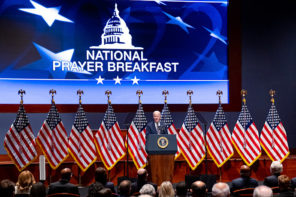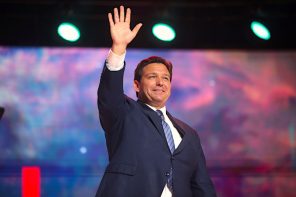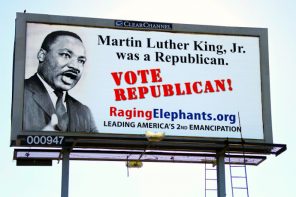There has been plenty of media coverage of Obama’s continuation of Bush’s faith-based initiatives, but considering the clues left by the Obama administration in the last week or so, it seems that the press has largely missed the point.
Most stories have focused on the legality of faith-based hiring. It is true that the Obama folks, too, have reinforced the importance of this issue by preemptively hastening to assure its base that it fully intends to comply with the Constitution and that it is fully committed to the separation of church and state. But, if one listens more closely, one can see that the new administration, like the previous one, has a plan to use religion to further its political goals.
Like the Bush administration, the Obama administration understands that since we are over the anti-Catholic politics that produced separationism, most Americans are returning to an understanding of religion that sees religion as something entirely natural and universal. It is natural to be religious, and each person should have the complete freedom to make that operative in his life in any way that he chooses. Religion—faith—is something that we hold in common. All of us.
Listen to President Obama at the National Prayer Breakfast on February 5:
There is no doubt that the very nature of faith means that some of our beliefs will never be the same. We read from different texts. We follow different edicts. We subscribe to different accounts of how we came to be here and where we’re going next—and some subscribe to no faith at all.
In other words, it is in the nature of faith that some subscribe to “no faith.” But, he continues:
We know. . . that whatever our differences, there is one law that binds all great religions together. Jesus told us to “love thy neighbor as thyself.” The Torah commands, “That which is hateful to you, do not do to your fellow.” In Islam, there is a hadith that reads “None of you truly believes until he wishes for his brother what he wishes for himself.” And the same is true for Buddhists and Hindus; for followers of Confucius and for humanists. It is, of course, the Golden Rule—the call to love one another; to understand one another; to treat with dignity and respect those with whom we share a brief moment on this Earth.
“All great religions”—the three Abrahamic religions, as well as Hinduism, Buddhism, Confucianism, and humanism—at least, believe in the Golden Rule, and:
[T]he particular faith that motivates each of us can promote a greater good for all of us. Instead of driving us apart, our varied beliefs can bring us together to feed the hungry and comfort the afflicted; to make peace where there is strife and rebuild what has broken; to lift up those who have fallen on hard times. This is not only our call as people of faith, but our duty as citizens of America, and it will be the purpose of the White House Office of Faith-Based and Neighborhood Partnerships that I’m announcing later today.
Whether we are believers or not, it seems, “we” have something called “faith.” We all believe in the greater good—and in the urgency of economic recovery.
On Thursday, President Obama signed an executive order establishing a White House Office on Faith-Based and Neighborhood Partnerships to be led by Joshua Dubois, a 26 year-old poli-sci graduate of Boston University and Princeton University’s Woodrow Wilson School who has also served as a part-time pastor at a Pentecostal Church in Cambridge, Massachusetts. According to the press release on the White House Web site, the new Office will have four priorities:
* The Office’s top priority will be making community groups an integral part of our economic recovery and poverty a burden fewer have to bear when recovery is complete.
* It will be one voice among several in the administration that will look at how we support women and children, address teenage pregnancy, and reduce the need for abortion.
* The Office will strive to support fathers who stand by their families, which involves working to get young men off the streets and into well-paying jobs, and encouraging responsible fatherhood.
* Finally, beyond American shores this Office will work with the National Security Council to foster interfaith dialogue with leaders and scholars around the world.
In the interviews with Mr. Dubois, reporters have focused on policy issues and on the legal questions. No one has asked Mr. Dubois about his theology. But there are some clues to his theology: It was Mr. Dubois apparently who pressed the president to choose Rick Warren to offer the invocation at the inauguration. And one assumes it was Mr. Dubois who told the president the history of the prayer breakfast as he recounted it in his “sermon”:
It’s a tradition that I’m told actually began many years ago in the city of Seattle. It was the height of the Great Depression, and most people found themselves out of work. Many fell into poverty. Some lost everything.
The leaders of the community did all that they could for those who were suffering in their midst. And then they decided to do something more: they prayed. It didn’t matter what party or religious affiliation to which they belonged. They simply gathered one morning as brothers and sisters to share a meal and talk with God.
These breakfasts soon sprouted up throughout Seattle, and quickly spread to cities and towns across America, eventually making their way to Washington. A short time after President Eisenhower asked a group of Senators if he could join their prayer breakfast, it became a national event.
Actually the founder of the prayer breakfast was Abraham Vereide, a Norwegian-born Methodist preacher. Motivated largely by a desire to fight socialism and communism, Vereide described his vision in 1946:
One world in active cooperation in commerce, science, labor and education should be one world in spiritual unity and moral convictions. There is only one Book for the whole world—the Bible. There is one Personality for all ages, all races and all people, the only One in whose life there is no discrepancy, in whose character there is no flaw, demanding universal obedience because of who he is . . . He is Jesus, the Christ.
Vereide was a hero of the last administration. But the divisive history of the prayer breakfast—and of faith-based politics—is being rewritten. It is no longer driven by the Cold War or the politics of resentment. It need not apologize. It’s about everyone, not just white evangelicals. And not just about Jesus.
Mr. Dubois obviously shares the president’s faith in community and his love of the narratives and worship style of the black churches. He is also very cheerful; he is not mad at anyone. We just all need to love one another and buy into the administration’s agenda.
The law on faith-based hiring will likely assist that effort.




